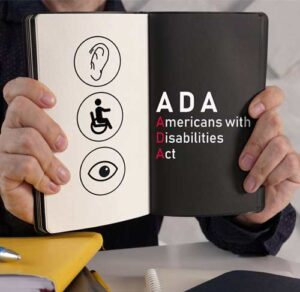
California’s pending ADA Website Lawsuit bill, AB 1757, creates new web developer and website provider liability with major penalties for creating or assisting with websites that do not meet “standard” that cannot be objectively measured. AB 1757 will likely force website developers to leave California and result in a massive shutdown of business websites, all to the loss of consumers, including disabled consumers. For years, the Karlin Law has been advocating for “safe harbor” standards that will allow a business to know if they have met any requirements for website accessibility. While this bill attempts to address these issues, it completely misses the mark and causes far more harm than good. Here’s why:
AB 1757 Will Drive Website Developers Out of California. The bill creates major liability for any person who creates, develops, or maintains a website for others if the website does not adhere to a “standard” which is impossible to test. Since there is no test for compliance, no web developer will want to be exposed to a lawsuit for not meeting a “standard” that he or she can’t tell they have met.

AB 1751 Will cause 120,000 businesses to shut down their websites or not put up a website, all to the loss of consumers and causing a major loss of sales tax revenue. Because most all web developers will not be willing to take the risk, businesses will find it difficult to find anyone to maintain or create a website. If they do find someone, instead of spending $1,500 to create or maintain a website, it will cost $7,000 to $10,000, resulting in small and micro businesses closing their websites or not putting up a website. There are 4 million small business websites in California. If just 3% close or do not put up a website, that’s 120,000 businesses that consumers will not find or purchase their goods or services from, resulting in massive tax revenue losses to the State. Many of these consumers will be persons with disabilities, the very people the bill was intended to protect.
AB 1757 is based on the false assumption that Websites can be objectively tested for accessibility. In particular, there is the false assumption that websites can be objectively tested for compliance with a set of “guidelines” called WCAG 2.1 level AA. However, the people who developed these “guidelines” acknowledge that there is no simple, objective test for compliance. That means any website accused of not meeting these guidelines will face years of litigation arguing over program coding, with no clear resolution, which is devastating to small businesses. While it is true that the situation is not much different now, AB 1757 does not change that situation. Reference to WCAG 2.1 level AA is no safe harbor (nor is any other version of WCAG for that matter). Time and input from experts is needed to set forth low-cost testing methods that meet acceptable levels of accessibility, and that are clear, objective, and low-cost to small business. That will take time.
AB 1757’s recent amendment is based on another false assumption that there are certified testing personnel to review the 4 million California business websites. The latest amendment for another presumptive safe harbor will not help hardly any of California’s four million businesses because (a) only the largest publicly- traded corporations can afford this type of testing, and (b) there would need to be a hundred times more certified testers, which certification takes years to obtain. There are currently only 557 such certified testers worldwide, and 90% work for governments, universities, and a few of the largest publicly traded corporations. That leaves only about 60, with only about 30 to 40 in the United States, and about 5 to 10 in California. That means these California-based testers would need to handle about 400,000 websites each, and if all the US testers were employed for this task, that would mean 100,000 per person. At one per day, with follow-up and consultation on modifications, it would take California-certified testers 1,538 years to complete the testing, and if all the testers in the US that are not working for governments, universities and major corporations were employed for this task, it would “only” take them 384 years to complete the task (and that assumes there will be no websites created over the next 384 years).
Currently, the cost of testing and advising on WCAG 2.1 level AA runs into the tens of thousands of dollars for a single, one-time certification. With few people available for such work, it is expected that the cost will skyrocket. This is hardly a cost that can be borne by small and micro business. What is more, AB 1757 provides that the 12-month certification expires as soon as any change is made to the website that affects accessibility. If changes are made to a website once a month with the addition of a new product or new menu item for any certification to be meaningful, recertification would need to be done on a monthly basis. This would increase the cost to small business tenfold, making this so-called safe harbor far beyond the reach of almost every small business.
More Certified Testers Will Not Come Soon. While one might speculate that more people may obtain the credentials, it is worth noting that it takes years of experience to even qualify to take the required examinations, which is why there are only 557 worldwide and why 90% work for organizations that can support the preparation and education required. Of the estimated 40 private certified testers in the United States, our investigation suggests that that 25 to 30 are now employed by a single company who because of the cost associated with this level of testing, appear to mainly service the nation’s largest corporations.
What is Needed. AB 1757 has been going through numerous amendments in the last eight weeks. While there has been substantial improvement as a result of amendments incorporating many of the ideas we have presented, the bill needs more input from the best experts representing small and micro businesses that have had to deal with website accessibility claims, from web developers who create and maintain websites, and from consumers who need access to websites, as well as from people with disabilities regarding what is most important to them is accessing information on websites. The bill needs to be tabled now to allow for modifications to the bill following meaningful input from all stakeholders.

